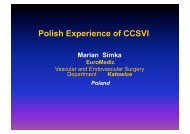ISNVD Abstract Book
ISNVD Abstract Book
ISNVD Abstract Book
Create successful ePaper yourself
Turn your PDF publications into a flip-book with our unique Google optimized e-Paper software.
WEDNESDAY – FEBRUARY 22, 2012 3:00pm-3:20pm<br />
Is CCSVI a disease? (Robert Zivadinov, USA)<br />
A condition called chronic cerebrospinal venous insufficiency (CCSVI) has been proposed and reported with<br />
high frequency in patients with multiple sclerosis (MS), although the condition was also found in patients with<br />
other CNS diseases and subjects without known CNS pathology. More recent reports suggest that some non-<br />
CNS diseases (especially of the bowel system) may be associated with CCSVI. CCSVI is described as a vascular<br />
condition characterized by anomalies of the main extra-cranial cerebrospinal venous routes that possibly<br />
interferes with normal blood outflow of brain parenchyma. In order for CCSVI to be a disease, a phenotype of<br />
clinical symptoms associated with this condition needs to be determined. The rate of transfer of nutrients<br />
(primarily oxygen and glucose) from the capillary bed into the brain fluid is proportional to the rate of blood<br />
flow through the capillary bed. An obstruction of the extra-cranial venous drainage pathways may significantly<br />
reduce the supply of brain nutrients and potentially result in hypoxia. In a recent prospective, 12-month,<br />
Endovascular Venous Treatment for MS (EVTMS) follow-up study that enrolled 15 MS patients, we noticed that,<br />
post intervention, the majority of treated patients reported immediate temporary improvements in subjective<br />
complaints of fatigue and cognitive impairment. In another recent study, the reestablishment of cerebral<br />
venous return reduced chronic fatigue perception in a group of 31 MS patients with CCSVI who underwent the<br />
endovascular procedure, suggesting that fatigue could likely be associated with CCSVI. Neither study was<br />
randomized, controlled or blinded; however, both suggest that the impact of removing an obstruction in the<br />
IJV or azygos veins could increase blood flow through the cerebral capillary bed, with consequent increase in<br />
the transfer of oxygen, glucose and other nutrients into the brain, which may result in immediate temporary<br />
reduction of subjective complaints of fatigue and cognitive impairment. Additional improvement of symptoms<br />
may be related to PTA of extra-cranial veins. These include headache, sleep disturbances, brain fog, and<br />
heating. It remains to be determined whether the presence of CCSVI is characterized by a particular clinical<br />
phenotype in patients with CNS and non-CNS diseases. The clinical phenotype will likely depend on the<br />
regional predilection of CCSVI pathology.<br />
Financial Disclosure: Teva Pharmaceuticals, Biogen Idec, EMD Serono, Genzyme, Bracco, Questcor, Greatbatch




